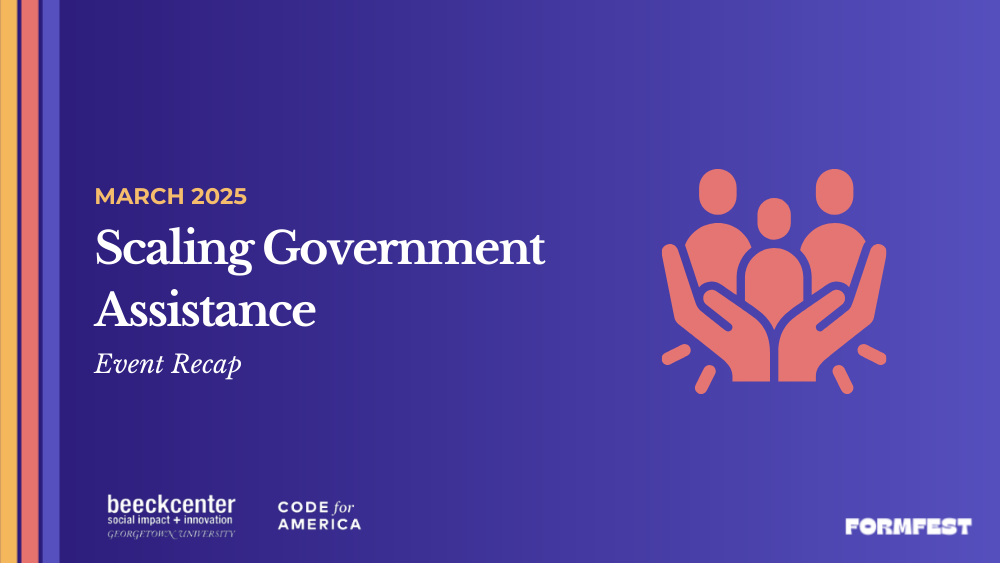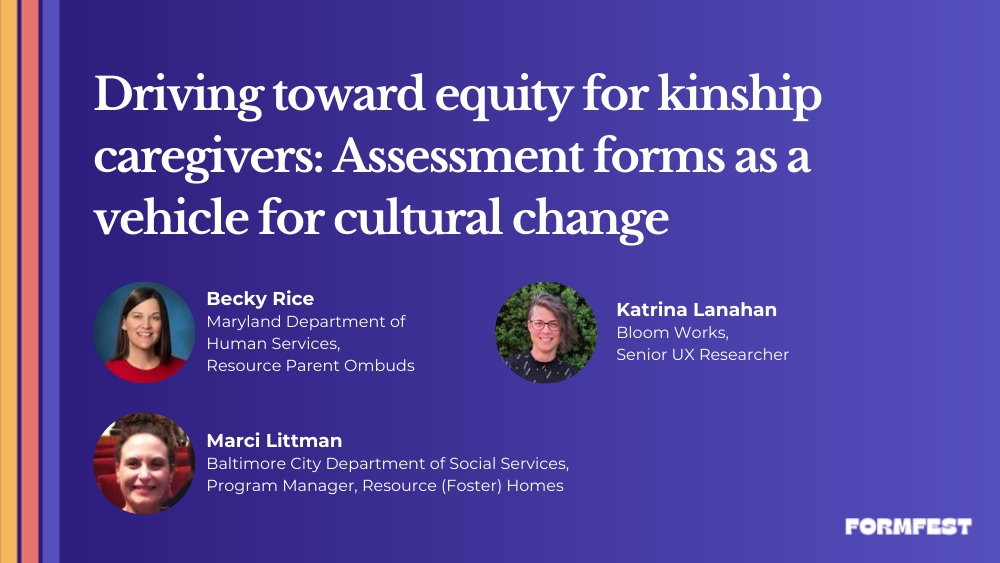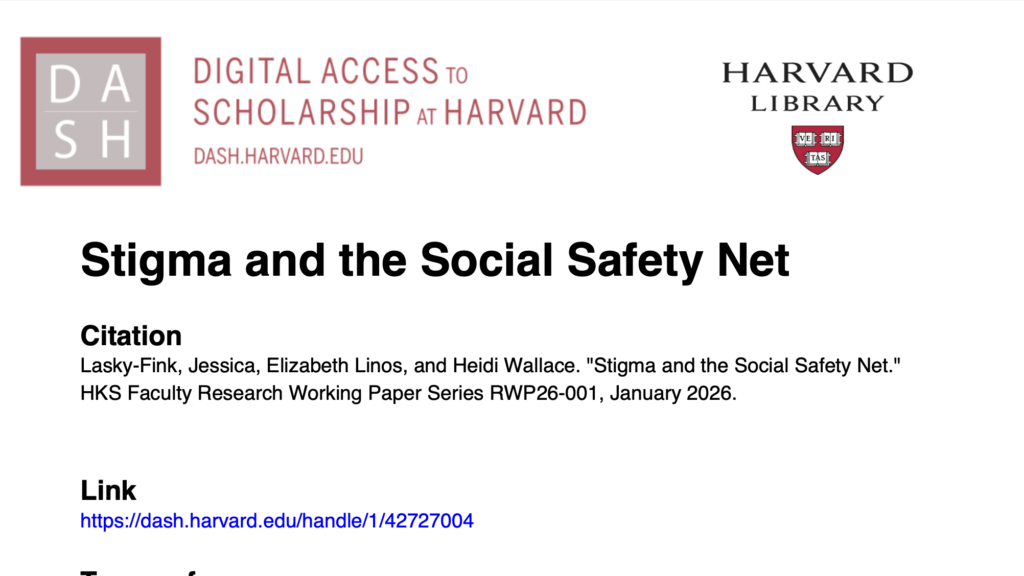FormFest 2024 Recap: Scaling Government Assistance
An event recap from one of FormFest 2024’s breakout sessions featuring speakers from the state of Maryland’s Department of Social Services and the U.S. Department of Health and Human Services (HHS).

These sessions from FormFest 2024 covered how to scale up assistance programs to ensure that people can get the help they need. Attendees learned about the work of Maryland’s Department of Social Services to improve welfare support for kinship caregivers and the U.S. Department of Health and Human Services’ (HHS) work on the Low-Income Home Energy Assistance Program (LIHEAP).
Driving toward Equity for Kinship Caregivers: Assessment Forms as a Vehicle for Cultural Change

Katrina Lanahan from Bloom Works and Marci Littman and Becky Rice from Maryland’s Department of Social Services shared how they transformed their kinship caregiver assessment forms into a vehicle for cultural change. The team’s work started after a new federal rule allowed child welfare agencies to change the foster home licensing standards for kinship caregivers. Kinship caregivers are individuals, often relatives or chosen families, who care for children in foster care. Licensing is essential for these families in order for them to receive the foster care stipend. Despite how critical this service is, only 25% of kinship caregivers in Maryland are licensed and receiving financial support, even though the foster child remains in their care.
In order to face this problem head-on, the team at Bloom Works decided to capitalize on the new federal rule as an opportunity to change the licensing game and enable more families to be approved and licensed. They reached out to national organizations and designed a national template that could be adapted and used to license kinship caregivers across the United States. This template is currently being piloted in Baltimore, Maryland, in conjunction with several other places across the country. This template reduces the burden of the licensing process on kinship caregivers by minimizing the hurdles families must overcome to get licensed.
In Maryland, the Department of Social Services was able to leverage this template to select questions and develop a licensing process tailored to the state. They consolidated many forms into a single form, reducing the burden on users and staff while making reviews easier. They also reduced the licensing process’ reliance on outside assessments and made the licensing forms uniform across the state of Maryland. Most significantly, they used these forms as a vehicle to drive a cultural shift in how kinship caregivers were treated throughout the licensing process. They removed judgemental questions that did not offer caregivers dignity or respect, introduced questions that offered more leeway to caregivers, and shifted the form away from a pass/fail system. Overall, these changes helped improve the relationship caregivers had with the social workers and reduced the number of caregivers denied financial support for the children in their care.
Money in the [Question] Bank: Designing and Testing Edits for LIHEAP Applications
![Money in the [question] bank: Designing and testing edits for LIHEAP applications. Headshot of Katherine Saul: U.S. Department of Health and Human Services, Benefits Transformation Officer. Headshot of Emilia Ndely-Ogundipe: U.S. Department of Health and Human Services, Presidential Innovation Fellow. Headshot of Lousia Sholar: Digital Service at ACF, Service Designer/U.S. Digital Corps Fellow. Headshot of Megan Meadows: U.S. Department of Health and Human Services, Director, Division of Energy Assistance. Headshot of Katie Green: U.S. Department of Health and Human Services, Chief of Staff. FormFest.](https://digitalgovernmenthub.org/wp-content/uploads/2025/03/9-LIHEAP.png)
This panel was held to share the work done by team members from the U.S. Department of Health and Human Services (HHS) to develop a plain language question bank for the Low-Income Home Energy Assistance Program (LIHEAP). The panel was led by Katherine Saul, Megan Meadows, Louisa Sholar, Emilia Ndely-Ogundipe, and Katie Green. LIHEAP is a federally funded block grant program available to U.S states, tribes, and territories. Grant recipients administer the program locally and are not required to run their programs in the same manner or use the same forms. This creates challenges for ensuring that forms are clear, concise, and meet user needs. Additionally, many grant recipients have noted they do not know where to start when creating forms and often do not have the capacity to create customer-centered forms, leading to applications that are overly complicated, lengthy, and designed without input from customers.
To remedy this problem, the team at HHS worked together to develop a form design template that could be adapted to meet local needs. They began with research and a landscape analysis of 14 U.S. applications to understand core customer questions and trends in form language. From this information, the team developed a taxonomy of familiar terms and wrote plain language definitions for common terms. After developing a presentation order for questions based on difficulty and incorporating plain language best practices into a template prototype, they tested it with grant recipients, administrators, and customers to gather feedback. This testing used a Google document to house the prototype design, as the team found that lower-fidelity prototypes reduced barriers to entry for research participants and fostered a more comfortable environment for candid feedback. While they are still actively testing this prototype, the team is hopeful that this template will improve the application experience by providing grant recipients with a tool they can use to streamline their application and tailor forms to their needs.
At the end of the presentation, Sholar shared some tips for replicating these results in other organizations. She said it was important to work collaboratively with program offices and view them as teammates instead of only partners in the improvement process. Additionally, she recommended that teams should validate content with key stakeholders and test content with users. Next, Sholar noted that developing content that can be implemented by section can help people easily take what they need from a template and adjust their forms to fit specific local needs. Finally, she highlighted 18F, PlainLanguage.gov, and the Department of Labor’s plain language sites as helpful resources for teams interested in employing plain language in their forms. Overall, this presentation showed how plain language and flexible content models can be powerful tools for improving form experiences.
Key Takeaways
- Treat users with care and dignity. It is important to meet users where they are and screen questions and form language for implicit judgement or negative connotations. Gathering feedback early and often from users and integrating it into form structures is one tool that organizations can use to facilitate this process.
- Customize to your target audience. Determine users’ actual needs and find ways for administrators to tailor forms to their specific contexts. Creating templates that administrators can implement in full or in part can help them better cater to their communities while reducing administrative burden.
- Remember language is powerful. Exploring plain language best practices and ensuring forms are clear, concise, and jargon-free can greatly improve user experiences. When removing jargon is not possible, using help text, providing more context, or adding parenthetical definitions can help users navigate form requirements without needing to visit other pages.
- Build with, not for. Determine what your department can do to help users by using active listening and gathering feedback from stakeholders, rather than developing solutions in a silo. By viewing program administrators as teammates in the form improvement process, organizations can ensure their solutions positively impact user and administrator experiences.
See more from this session at FormFest 2024:
Watch the session recording and more from FormFest 2024.
Scaling Out Government Assistance
This session from FormFest 2024 focused on how to help people get the assistance they need from the U.S. Department of Health and Human Services’ work on the Low Income Home Energy Assistance Program (LIHEAP) and the Maryland Social Services Administration’s work to improve welfare support for kinship caregivers.
About FormFest
FormFest is a free virtual event showcasing governments working to make services accessible to everyone through online forms. Discover best practices and tools that are shaping the future of form design and service delivery.


